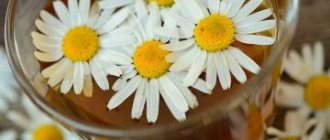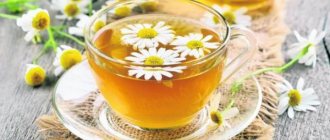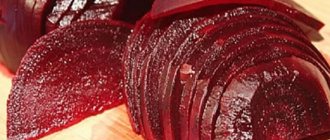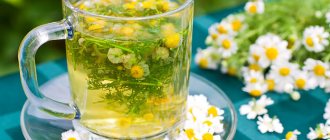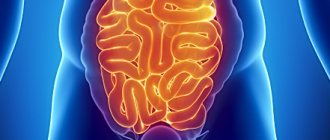Many people have been treating the gastrointestinal tract with chamomile since ancient times. This plant is rich in biologically active substances that have a beneficial effect on the human body. The inflorescences successfully relieve inflammation due to the fact that the corresponding mediators are reduced.
Due to chamomile, people rarely experience adverse reactions that are typical of pharmaceutical anti-inflammatory drugs. The plant does not raise blood pressure, does not injure the gastric mucosa, and does not have a nephrotoxic effect. This means that it can be safely prescribed for the intestines and stomach.
A huge advantage is the low cost of flowers - up to 100 rubles.
Effect on the body
This plant contains many vitamins, minerals and trace elements that have a positive effect on the human body. Due to its rich composition of benefits, in some cases it replaces medications from the pharmacy. That is why it is so often used to treat many ailments. It is used as:
- analgesic, sedative, choleretic agent;
- means for regeneration of the mucous membrane of the stomach and intestines;
- healing drug;
- blood circulation stimulant.
This plant can temporarily relieve toothache or cure insomnia. If you treat a wound with chamomile decoction, it will heal much faster.
Using inflorescences to treat the intestines and stomach
Often the flowers of this plant are used to treat and prevent diseases of the stomach and intestines. They are also used in combination with other drugs to get rid of ailments.
Flowers are often used in gynecology to treat a variety of diseases.
If a patient has been diagnosed with an ailment in the gastrointestinal tract, chamomile is prescribed. As a result of using infusions and decoctions, the production of gastric juice and bile is stimulated, the number of fermentation processes in the body decreases, and pain stops completely. In addition, all inflammatory processes are minimized, and the mucous membrane is cleansed.
Treatment of colitis
One of the most common intestinal ailments is colitis. This pathology occurs as a result of inflammatory processes in the intestines, which appear as a result of a variety of reactions. Most often, colitis occurs from poor nutrition, deterioration of metabolism and digestion. In turn, they appear from diseases of the gallbladder and pancreas.
Chamomile is often used to treat colitis. It has an anti-inflammatory effect (reduces inflammation in the intestines), interrupts the clinical manifestations of the disease, which are expressed in the form of sharp pain. In this case, chamomile for the stomach and intestines soothes and gently relieves inflammation.
In serious stages of the disease, you should not rely only on herbs - be sure to seek help from a doctor.
When should you not drink chamomile?
If pain is observed in the intestines as a result of inflammation, chamomile infusion can relieve them. Please note that products based on this plant do not have an antispasmodic effect. The maximum that chamomile can do is relieve pain if it is caused by a spasm as a result of the inflammatory process. In other situations, an infusion of chamomile inflorescences will have a more psychosomatic effect.
If you have regular pain, you should not drink chamomile infusion. It can smooth out symptoms, making it difficult to make a correct diagnosis. In case of serious and regular pain, there is no need to mindlessly drink chamomile and wait for the pain to subside.
Chamomile pharmaceutical products
If the characteristics of the body do not allow the use of products made at home from herbal raw materials, you can resort to the use of chamomile pharmaceutical products. They, of course, include a little more substances that are potentially dangerous to the body. But the speed of action of the described drugs is much higher.
Romazulan
Romazulan is a combined herbal medicine produced in the form of a solution for external or local use. The main components of Romazulan are chamomile flowers and guaiazulene. They allow the drug to be used in the complex treatment of gastritis, colitis, flatulence and duodenitis, that is, an inflammatory disease of the duodenum.
Usage
To treat intestinal diseases, medicinal chamomile is used in two variations: they drink infusions or give enemas. It is believed that the latter cleanse the intestines more effectively. If you need to cleanse your intestinal tract, a chamomile enema is best. It is lightweight and effective. If you drink an infusion or decoction of the inflorescences, the intestines will not be cleansed, but the anti-inflammatory effect will be much longer.
Remember the rule: if it hurts severely and often, you need to go to the doctor. Most cancer patients attributed the first symptoms to cramps and bad food.
Preparation of chamomile
For diarrhea syndrome, you can prepare chamomile infusion or tea (hot or cold). A flower infusion may also help. If the malaise is accompanied by acute pain, then you need to drink an infusion or decoction. They are more concentrated and start working faster.
Chamomile for diarrhea in the form of tea is recommended for a mild form of the disorder, not burdened by unpleasant symptoms. This drink does not contain glucose, protein or dietary fiber, which can worsen diarrhea. It is rich in folic acid, vitamins, minerals, and fluorides.
Chamomile recipes:
- The medicinal infusion is prepared as follows: 40 g of raw materials are rubbed by hand. Pour 800 ml of boiling water, cover the resulting liquid and wrap it in something warm. You can pour the liquid into a thermos, which will speed up the preparation time of the medicine and make it richer. After cooling, the solution is filtered.
- The decoction is brewed according to this recipe: Pour a tablespoon of chamomile flowers into 250 ml of water. Afterwards, the mixture should be brought to a boil and boiled for about 30 minutes. Cool and filter. The finished drug can be stored for no longer than three days.
- Chamomile tea for diarrhea in adults and children can be bought in the pharmacy chain. It is packaged in bags and consists of ordinary plant inflorescences. The brewing recipe is quite simple: boil a glass of water and throw a bag into it. Leave for 15 minutes and drink warm.
How to prepare a decoction to treat poisoning?
To make a decoction, you need to simmer the flowers over low heat for a quarter of an hour. Then turn off the fire and let the product cool. The cooled broth should be strained. It is recommended to consume the pure composition warm. The period of administration and dose depend on the specific ailment.
To cure an upset stomach, you need to prepare a chamomile decoction over low heat. It's better to drink it from a thermos. It is recommended to prepare in a ratio of 5 grams of raw materials per 0.5 liters of water. It is recommended to let it sit for three hours and then strain. The decoction should be taken one glass at a time. You need to drink a liter of chamomile per day.
To enhance the effect of poisoning, it is recommended to give a chamomile enema. In this combination, a chamomile decoction for the stomach and intestines will be most beneficial.
To enhance the effect of poisoning, it is recommended to give a chamomile enema. In this combination, a chamomile decoction for the stomach and intestines will be most beneficial.
Application
Alternative medicine contains different recipes for chamomile for diarrhea. The main advantage of the funds is their availability. To treat diarrhea, you can buy chamomile tea at any pharmacy or collect chamomile yourself. In order for the treatment to be beneficial, you need to take into account the proportions, indications for use, choose the right recipes, and other criteria for use.
It is difficult to get rid of diarrhea by drinking exclusively herbal tea; general recommendations must be taken into account: avoid fatty, fried, spicy foods, and limit the consumption of carbonated mineral water. They eat rice porridge cooked in water, applesauce, bananas, protein foods, and low-fat fermented milk products.
Use for adults
Chamomile tea helps with diarrhea when the cause of the disorder is not caused by serious infectious diseases. In case of infection, you should consult a doctor.
Recipes that have proven their effectiveness:
- For the decoction, pour 2 tablespoons of dried flowers into a liter of boiling water and leave for at least an hour. After preparation, you should take 200 ml 1 hour before meals, 4 times a day.
- A spoonful of dried flowers is filled with 1/2 liter of clean water. Boil for 10 minutes. Then the product is filtered, cooled and drunk 3 times a day before meals, 250 ml.
- Chamomile decoction with mint. Mix dried flowers in equal parts (1 teaspoon each), pour in 1/2 liter of boiling water, leave for an hour, filter, drink slowly, in small sips.
- Chamomile with yarrow. Raw flowers are mixed in equal proportions (1/2 cup each), poured with boiling water, and allowed to stand for at least an hour. Strain and add 4 tablespoons to tea.
- 1 tablespoon of dried flowers is poured into 1/2 liter of boiling water, heated in a water bath for 10-15 minutes. The decoction is filtered and taken half a glass four times a day.
- Hot infusion. 1 tablespoon of raw flowers is poured into a thermos and poured with a glass of boiling water. Let it brew for 3 hours. A glass of concentrate is diluted with water to 500 ml, taken after meals three to four times a day until diarrhea stops. Store the resulting infusion in a cool place for no more than 2 days.
- Pour 2 tablespoons of dried flowers into a glass of drinking water and leave in a dark place at room temperature. The decoction is stored in the same way as hot decoctions.
- It is allowed to use pharmacy chamomile tea. 1 sachet is filled with 300 ml of water and drunk 3 times a day before meals.
Take chamomile tea until symptoms disappear. To consolidate the effect, it is recommended to continue treatment for a couple more days.
Loose stools dehydrate and require replenishment of water and electrolyte balance. An adult should drink 2-3 liters of rice water or saline solution (for 1 liter of boiled water, 1 tablespoon of salt and 1 tablespoon of sugar).
Use for prophylactic purposes
The medicinal properties of chamomile collection are multifaceted. If diarrhea occurs frequently and there are no serious illnesses, it is permissible to drink infusions for preventive purposes. Prevention has a beneficial effect on the body’s condition, helps strengthen it, improves immunity, and improves mood.
Diarrhea is caused by disorders of the nervous system. Chamomile tea has a sedative effect, calms the nerves, and makes it easier to fall asleep.
For prevention, low dosages are taken; for adults, 1 glass of decoction is spread over the day; children are offered a quarter glass per day.
Use in children
Stomach upset occurs in adults and children. Diarrhea is sometimes caused by an intestinal infection, accompanied by abdominal pain, vomiting, and high fever. It is more difficult for children to tolerate intestinal upset. When you have diarrhea, you need to drink more fluid; loose stools cause dehydration.
Treatment of diarrhea in a child is carried out according to similar recipes as for adults, the difference is in dosage and frequency of use. The danger of using herbal infusions in a child is the possible occurrence of allergies. The risk of this scenario can be reduced by combining chamomile with mint. This composition will help avoid allergies and replenish fluid deficiency. For the decoction, mix the raw materials in equal proportions (1 teaspoon each), pour boiling water in a thermos, infuse, strain, and offer to the child in proportions appropriate for his age.
If the child has no allergic reactions, prepare a standard decoction: 1 tablespoon of dried flowers, pour 300 ml of boiling water, chill, filter. For children under 12 years of age, the following regimen for using chamomile infusions is recommended:
- 1 dessert spoon of chamomile tea at a time for children under 1 year. No more than 100 ml per day.
- From 1 year to 3 years, the decoction is given 2 tablespoons at a time. No more than 200 ml per day.
- From 3 to 6 years, 5-8 tablespoons at a time. No more than 400 ml per day.
- A child over 6 years old can drink 10-12 tablespoons 1 time per night.
This is a universal natural remedy that helps with intestinal disorders. Chamomile reduces intestinal inflammation, hardens stool, improves appetite, strengthens the immune system, and smoothes out uneven manifestations of the nervous system. But the flower can cause allergies, and there are contraindications for use. It is recommended to discuss the use of chamomile infusion with your doctor.
The mechanism of the effect of herbal tea on the body
Thanks to this method, toxins are washed out of the body. The beneficial components of the product are absorbed. As a result, the fermentation process of food residues stops and gas formation stops. Thus, chamomile has an analgesic effect and colic goes away.
Depending on what specific illness you have to fight, doctors recommend taking chamomile tea or decoction from ten days to a month. After this you should take a short break.
Please note that with active, constant use, the body gets used to this plant. As a result, the effectiveness of the effect decreases with each technique, and then disappears altogether. Between courses you should take breaks that will be equal to the time you take the medicine.
Description of the plant
Chamomile (Matricaria chamomilla) is a typical species of the Chamomile genus, used in folk and traditional medicine, cosmetology and other areas of production. It is actively cultivated in Asia, Europe and North America, and as an invasive species, chamomile is widespread in all extratropical regions of the world. But the demand for the plant is not only due to its large habitat.
The most important thing is the combined properties of chamomile, which help even a weakened human body to recover faster.
Who is not recommended to take it?
Drinking chamomile tea is not recommended for those who are allergic to this plant. If you have been diagnosed with hypoacid gastritis with zero or low acidity, then each traditional medicine must be agreed with a doctor. If the treatment phase for stomach diseases is in full swing, drinking herbal infusions is prohibited. If remission is observed, it is necessary to monitor the body's reaction.
You should stop drinking chamomile if you experience nausea, aching pain in the stomach, vomiting, nervousness, heaviness in the stomach and dizziness. After stopping treatment, you should undergo examination. Do not take chamomile with alcohol. You cannot drink decoctions and infusions with blood-thinning and sedatives.
Chamomile is very gentle on the stomach, however, in infants it can wash out the intestinal microflora.
Doctors do not recommend drinking chamomile to pregnant women or those who are planning to conceive. Young children can be bathed in decoctions to relieve diathesis rashes and inflammatory processes. Infants can be given the infusion only after consultation with a pediatrician. It is forbidden to violate the frequency of administration and dosage.
Remember that chamomile can be very helpful for stomach pain. However, if you experience constant spasms, pain and disturbances in the gastrointestinal tract, you should consult a specialist for help. Otherwise, you will constantly relieve pain, and the serious problem will get worse.
If you have serious problems, consult your doctor before taking the infusion or decoction. It is also a good idea to consult a doctor before taking various herbs if you are pregnant. So, you can definitely protect yourself from the negative consequences of taking it.
Contraindications and side effects
Chamomile, like other medicines, has contraindications, and if it is used incorrectly, it can cause harm to the patient. For example, it is not recommended to use infusions together with aspirin, alcohol, sedatives and blood thinning medications. Also, chamomile should not be consumed during pregnancy or with anacid gastritis. No side effects have been identified if you take chamomile in recommended doses, however, an overdose is possible, which will lead to headaches, mild hoarseness, cough, painful menstruation and mental disorders.
